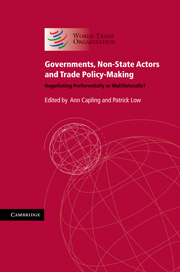Book contents
- Frontmatter
- Contents
- List of figures and tables
- List of contributors
- Acknowledgements
- Disclaimer
- Introduction
- 1 The domestic politics of trade policy-making: state and non-state actor interactions and forum choice
- 2 Chile
- 3 Colombia
- 4 Mexico
- 5 Indonesia
- 6 Thailand
- 7 Jordan
- 8 Kenya
- 9 South Africa
- 10 The influence of international non-state actors in multilateral and preferential trade agreements: a question of forum shopping?
- 11 Main findings and conclusions
- Index
- References
7 - Jordan
Published online by Cambridge University Press: 05 July 2014
- Frontmatter
- Contents
- List of figures and tables
- List of contributors
- Acknowledgements
- Disclaimer
- Introduction
- 1 The domestic politics of trade policy-making: state and non-state actor interactions and forum choice
- 2 Chile
- 3 Colombia
- 4 Mexico
- 5 Indonesia
- 6 Thailand
- 7 Jordan
- 8 Kenya
- 9 South Africa
- 10 The influence of international non-state actors in multilateral and preferential trade agreements: a question of forum shopping?
- 11 Main findings and conclusions
- Index
- References
Summary
This chapter explores how non-state actors (NSAs) seek to influence government policy in relation to the World Trade Organization (WTO) and preferential trade agreements (PTAs) as alternative venues for international trade cooperation. Little research has been done on NSA–government interaction on trade policy development in Jordan, and almost no analysis exists that captures and contrasts this interaction in relation to multilateral as opposed to bilateral or plurilateral negotiations. This chapter, based on interviews with representatives of government and NSAs, focuses on recent developments in Jordan’s trade policy-making. It has found that NSA activity in Jordan is relatively weakly developed compared with the other cases in this study, but that it is growing, in large part as a result of the influence of international actors, including US foreign aid donors and some other international business and civil society organizations (CSOs).
Section 1 surveys the evolution of trade policy and Jordan’s trade patterns. Section 2 outlines the key state and non-state actors involved in trade policy-making and the mechanisms for government consultation. Section 3 outlines Jordan’s key multilateral and preferential trade agreements. Section 4 explores the interactions between state and non-state actors in relation to trade negotiations, and considers the question of forum choice. Section 5 concludes.
- Type
- Chapter
- Information
- Governments, Non-State Actors and Trade Policy-MakingNegotiating Preferentially or Multilaterally?, pp. 186 - 213Publisher: Cambridge University PressPrint publication year: 2010



